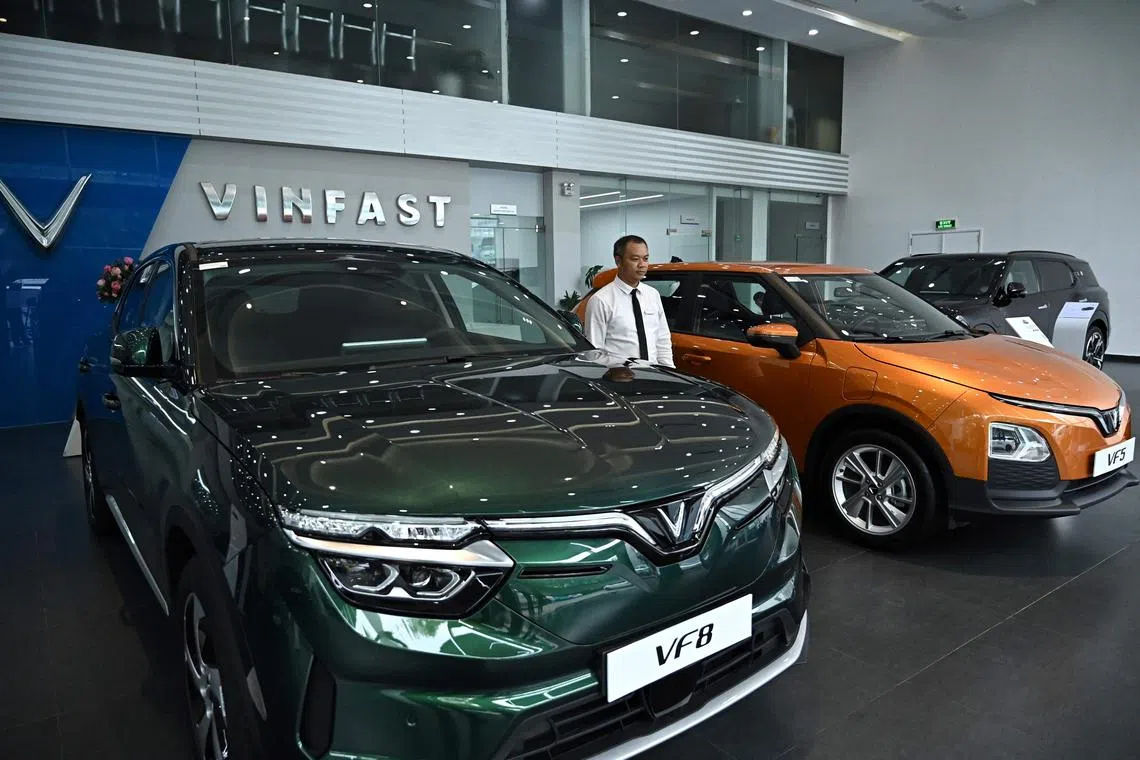Vietnam EV maker VinFast to invest up to $2.66 billion in India
Sign up now: Get ST's newsletters delivered to your inbox

VinFast, looking to make inroads into the world’s third-largest vehicle market, will build an integrated electric vehicle facility in the Indian state of Tamil Nadu.
PHOTO: AFP
HO CHI MINH CITY – Vietnamese electric vehicle (EV) maker VinFast announced on Jan 6 that it will invest up to US$2 billion (S$2.66 billion) to set up its first manufacturing facilities in India.
The company, which is looking to make inroads into the world’s third-largest vehicle market, said it will build an integrated EV facility in the southern state of Tamil Nadu. The initial investment will be US$500 million for the first five years of the project, it said in a statement.
The construction of this EV and battery manufacturing plant will start later in 2024 in the city of Thoothukudi in Tamil Nadu. The project will have an annual capacity of up to 150,000 units and create 3,000 to 3,500 jobs locally, the statement added.
There are also plans for VinFast to establish a nationwide dealership network in India to develop brand awareness and reach out to consumers.
It was a busy day for VinFast on Jan 6 as the company also announced that chairman Pham Nhat Vuong would become its new chief executive and directly oversee the company’s global operations.
Current CEO Le Thi Thu Thuy, who has held the post since late 2021, will serve as chairwoman and continue to engage with VinFast’s external stakeholders and fund-raising activities.
VinFast has four battery facilities in Vietnam. It also has two EV manufacturing plants – one in Vietnam’s Haiphong province, and the other under construction in North Carolina in the United States.
VinFast, which made its Nasdaq debut in August 2023 and has yet to turn a profit,
The Indian government has a target to boost this to 30 per cent by 2030 and is working on incentives and schemes to attract more EV makers.
“Foreign companies who want to crack the market in India will have to figure out domestic manufacturing,” said Mr Shashidhar Kagganti Jayakumar, a research associate at India-based research network Digital Futures Lab.
Investors will need to “understand the context of how things work in India”, he said, noting that there needs to be good after-sales service for EVs that must be suitable for India’s hot weather.
India is rolling out a scheme to grant subsidies to EV original equipment manufacturers that have at least 50 per cent of the vehicle components manufactured in India and locally sourced.
The national government is also offering different types of financial incentives to EV consumers, including direct discounts, exemption from road taxes and registration fees, and access to low-interest loans.
As things stand, said Mr Jayakumar, the growth of EVs in India is largely from two-wheelers as well as the ongoing green transition in the logistics sector.

VinFast chairman Pham Nhat Vuong (centre) will become the company’s new chief executive, taking over from current CEO Le Thi Thu Thuy (left), who has held the post since late 2021.
PHOTO: REUTERS
VinFast’s product portfolio includes electric cars and scooters, with deliveries of more than 21,000 and 48,000 units, respectively, in the first three quarters of 2023.
Green and Smart Mobility (GSM), an EV taxi operator mostly owned by Mr Vuong, bought roughly two-thirds of VinFast’s total car deliveries from March to September 2023. GSM is also offering EV rental and taxi services in Vietnam, Laos and Cambodia, with fleets entirely consisting of VinFast vehicles.
EV battery value chain
VinFast said it wants to have a deeper engagement with the EV battery value chain, which includes battery cells, battery packs and recycling.
Leveraging capabilities in battery manufacturing could deliver a “significant competitive advantage in cost-effectiveness”, a VinFast spokesperson told The Business Times in an e-mail.
According to some estimates, the cost of a battery could vary from 13 per cent to 32 per cent of the total cost of an EV, depending on the composition and the metals used.
Vinfast, which acquired its battery maker sibling VinES in October 2023, has mainly participated in battery pack production, with two factories in Haiphong and Ha Tinh provinces.
In August 2023, the Ha Tinh facility produced its first batch of battery packs with imported cells from foreign partners as it waits for cells from VinFast’s two other facilities.
In December, VinFast announced it was in talks with the US International Development Financial Corp for a US$500 million loan to establish a lithium-ion battery facility in Vietnam.
This will be an “independent project” from existing ones in Vietnam, with details to be revealed at “an appropriate time”, the spokesperson told BT.
VinFast in December also entered into a partnership with Japanese conglomerate Marubeni Corp to recycle used EV batteries and repurpose them into affordable battery energy storage systems. THE BUSINESS TIMES


